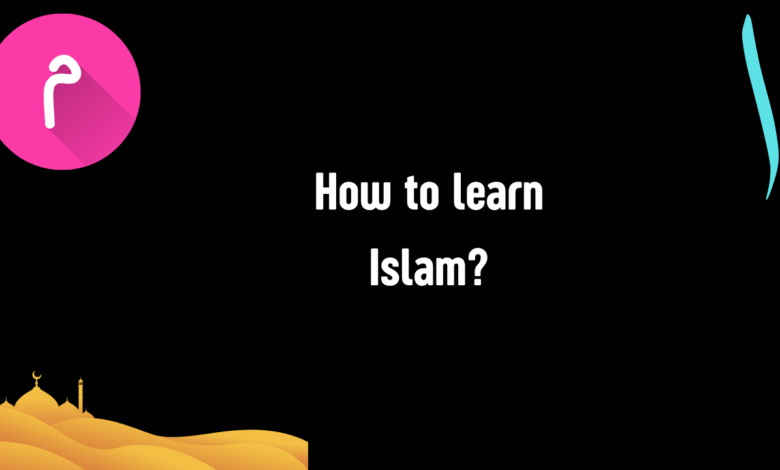How to learn Islam?

Introduction
Islam, one of the world’s major religions, holds a rich history, profound philosophy, and a comprehensive way of life. Learning about Islam is not only an intellectual pursuit but also a spiritual journey that requires an open mind, dedication, and sincere intention. Whether you are a newcomer to the faith or simply curious about its teachings, this article provides a comprehensive guide on how to learn about Islam.
Start with the Basics: Understanding the Core Tenets
Begin your journey by gaining a fundamental understanding of Islam’s core beliefs. The religion is built upon five pillars:
Shahada (Faith): The declaration of faith, which states, “There is no god but Allah, and Muhammad is his messenger.” This statement encapsulates the monotheistic nature of Islam and acknowledges Prophet Muhammad as the final messenger.
Salat (Prayer): Muslims are required to perform five daily prayers facing the Kaaba in Mecca. These prayers foster a connection between individuals and their Creator, serving as a consistent reminder of spirituality throughout the day.
Zakat (Charity): Muslims are obliged to give a portion of their wealth to those in need. This practice promotes compassion and helps to address economic inequalities.
Sawm (Fasting): During the month of Ramadan, Muslims fast from dawn until sunset. This practice teaches self-discipline, empathy for the less fortunate, and a heightened sense of spirituality.
Hajj (Pilgrimage): Those who are physically and financially able are required to undertake a pilgrimage to the holy city of Mecca at least once in their lifetime. Hajj emphasizes unity, humility, and equality among believers.
Read the Quran: The Holy Book of Islam
The Quran is the central religious text of Islam, believed by Muslims to be the literal word of God as revealed to Prophet Muhammad. Reading and reflecting upon the Quran is a crucial aspect of learning about Islam. Start by obtaining a copy of the Quran with translations in your preferred language, as well as a reputable commentary (Tafsir) to help you understand the context and meanings behind the verses.
Study the Life of Prophet Muhammad
To truly grasp the essence of Islam, it’s essential to study the life and teachings of Prophet Muhammad. His actions, known as Hadith, and his sayings provide invaluable insights into how to live a righteous and ethical life. There are numerous books and online resources that compile authentic Hadith collections, such as Sahih al-Bukhari and Sahih Muslim.
Enroll in Educational Courses
Many mosques, Islamic centers, and online platforms offer courses on various aspects of Islam, from basic teachings to advanced theological discussions. These courses provide structured learning, allowing you to delve deeper into specific topics such as Islamic jurisprudence (Fiqh), theology (Aqeedah), and spirituality (Tasawwuf).
Engage with Scholars and Experts
Seek guidance from knowledgeable scholars and experts in the field. Attend lectures, workshops, and seminars where you can interact with them and ask questions. Engaging in discussions with those who have a deep understanding of Islam can help clarify misconceptions and provide nuanced insights.
Practice Islamic Ethics in Daily Life
Learning about Islam isn’t just about acquiring knowledge; it’s also about implementing its teachings in your daily life. Embrace virtues such as honesty, compassion, humility, and patience. Treat others with kindness and respect, and contribute positively to your community.
Participate in Community Activities
Joining a local mosque or Islamic community can provide you with a supportive environment for learning and practicing Islam. Engaging in communal prayers, participating in charity events, and attending study circles can help you connect with fellow believers and deepen your understanding.
Remain Open-Minded and Patient
Learning about any religion, including Islam, requires an open-minded approach. Approach the process with curiosity and respect, and be patient with yourself as you navigate complex concepts. Remember that gaining a comprehensive understanding of Islam is a lifelong journey.
In conclusion, learning about Islam is a multifaceted endeavor that encompasses understanding core beliefs, reading the Quran, studying the life of Prophet Muhammad, enrolling in educational courses, engaging with experts, practicing ethics, participating in community activities, and maintaining an open-minded and patient attitude. By approaching your journey with sincerity and dedication, you can gain a deeper appreciation for Islam’s teachings and its role in shaping the lives of millions around the world.
FAQs about How to Learn Islam
What is the best way to start learning about Islam?
Begin by acquiring a basic understanding of the fundamental beliefs, practices, and history of Islam through reputable books, online resources, and introductory courses.
Are there any prerequisites for learning about Islam?
No prerequisites are required. Anyone with an interest in understanding Islam can start learning, regardless of their background or beliefs.
Where can I find reliable resources for learning about Islam?
Look for books authored by recognized Islamic scholars, reliable websites, and educational institutions that offer online courses on Islam.
How can I understand the core beliefs of Islam?
Study the Five Pillars of Islam (Shahada, Salah, Zakat, Sawm, Hajj) and the Six Articles of Faith (belief in Allah, angels, scriptures, prophets, the Day of Judgment, and divine decree).
Can I learn about Islam without learning Arabic?
Yes, it’s possible to learn about Islam in languages other than Arabic. Many resources are available in various languages to cater to different learners.
What is the role of the Qur’an in learning Islam?
The Qur’an is the central religious text of Islam. To learn about Islam, it’s important to read and understand the Qur’an’s teachings, message, and guidance.






